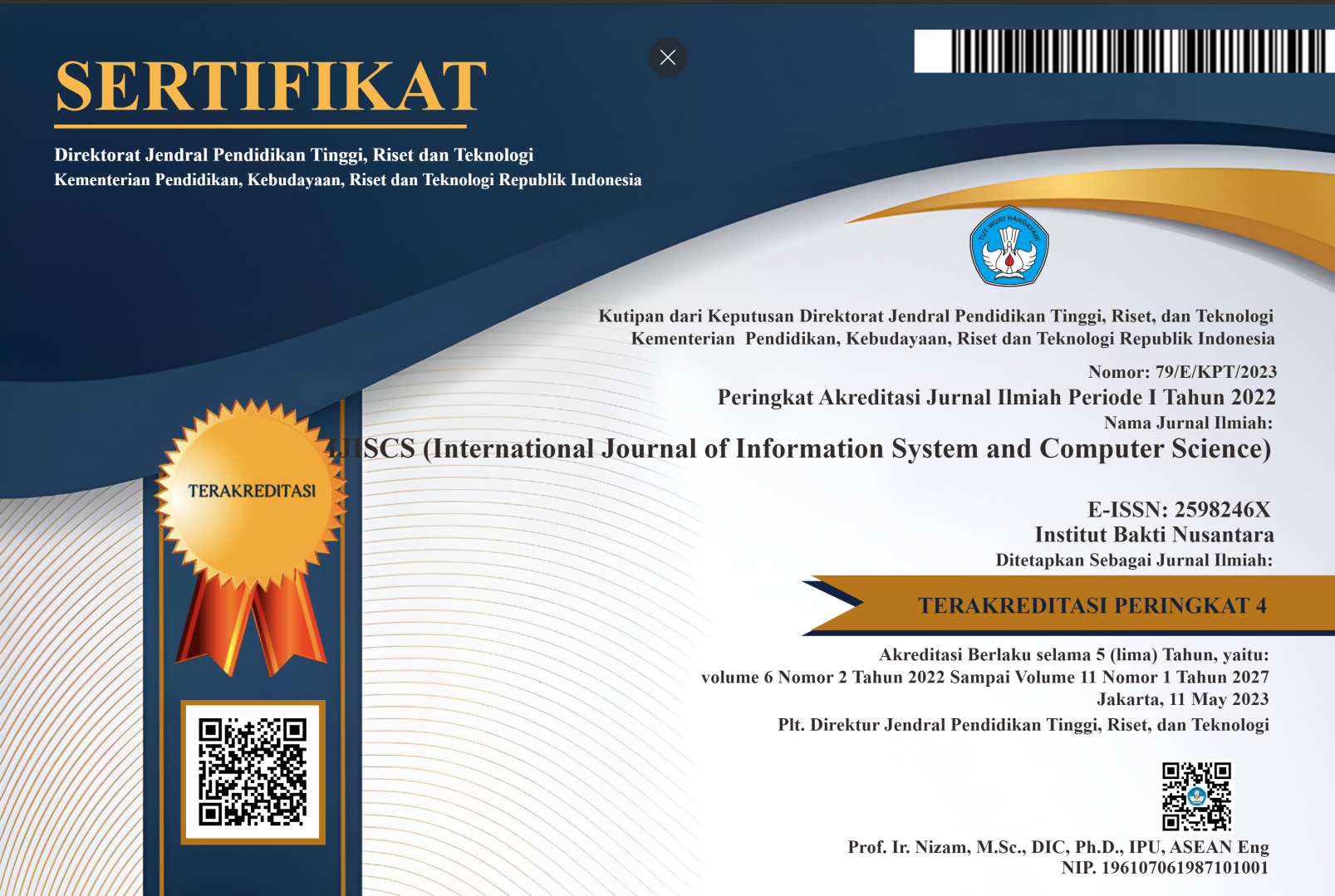STUDENT GRADUATION TIME PREDICTION USING LOGISTIC REGRESSION, DECISION TREE, SUPPORT VECTOR MACHINE, AND ADABOOST ENSEMBLE LEARNING
(1) School of Computer Science Bina Nusantara University, Jakarta
(2) School of Computer Science Bina Nusantara University, Jakarta
 Corresponding Author
Corresponding Author
Abstract
Keywords
References
BAN-PT, “Akreditasi Perguruan Tinggi: Instrumen Pemantauan Dan Evaluasi Peringkat Akreditasi Perguruan,” Jakarta, 2022.
J. Han, M. Kamber, and J. Pei, Data Mining: Concepts and Techniques. Morgan Kaufmann, 2022.
R. Bakri, N. P. Astuti, and A. S. Ahmar, “Machine Learning Algorithms with Parameter Tuning to Predict Students’ Graduation-on-time: A Case Study in Higher Education,” J. Appl. Sci. Eng. Technol. Educ., vol. 4, no. 2, pp. 259–265, 2022, doi: 10.35877/454ri.asci1581.
S. K. Wanjau and G. M. Muketha, “Improving Student Enrollment Prediction Using Ensemble Classifiers,” Int. J. Comput. Appl. Technol. Res., vol. 7, no. 03, pp. 122–128, 2018, doi: 10.7753/ijcatr0703.1003.
A. C. Lagman, L. P. Alfonso, M. L. I. Goh, J. A. P. Lalata, J. P. H. Magcuyao, and H. N. Vicente, “Classification algorithm accuracy improvement for student graduation prediction using ensemble model,” Int. J. Inf. Educ. Technol., vol. 10, no. 10, pp. 723–727, 2020, doi: 10.18178/ijiet.2020.10.10.1449.
D. Ruete et al., “Early Detection of Delayed Graduation in Master’s Students,” in ASEE Annual Conference and Exposition, 2021, pp. 1–20.
N. M. Suhaimi, S. Abdul-Rahman, S. Mutalib, N. H. A. Hamid, and A. M. A. Malik, “Review on Predicting Students’ Graduation Time Using Machine Learning Algorithms,” Int. J. Mod. Educ. Comput. Sci., vol. 11, no. 7, pp. 1–13, 2019, doi: 10.5815/ijmecs.2019.07.01.
C. W. Teoh, S. B. Ho, K. S. Dollmat, and C. H. Tan, “Ensemble-Learning Techniques for Predicting Student Performance on Video-Based Learning,” Int. J. Inf. Educ. Technol., vol. 12, no. 8, pp. 741–745, 2022, doi: 10.18178/ijiet.2022.12.8.1679.
S. C. Agrawal, “Deep learning Based Non-Linear Regression for Stock Prediction,” IOP Conf. Ser. Mater. Sci. Eng., vol. 1116, no. 1, pp. 1–7, 2021, doi: 10.1088/1757-899x/1116/1/012189.
E. A. Amrieh, T. Hamtini, and I. Aljarah, “Mining Educational Data to Predict Student’s academic Performance using Ensemble Methods,” Int. J. Database Theory Appl., vol. 9, no. 8, pp. 119–136, 2016, doi: 10.14257/ijdta.2016.9.8.13.
Article Metrics
Abstract View : 124 times
: 124 times Download : 50 times
Download : 50 times
DOI: 10.56327/ijiscs.v7i2.1579
Refbacks
- There are currently no refbacks.






